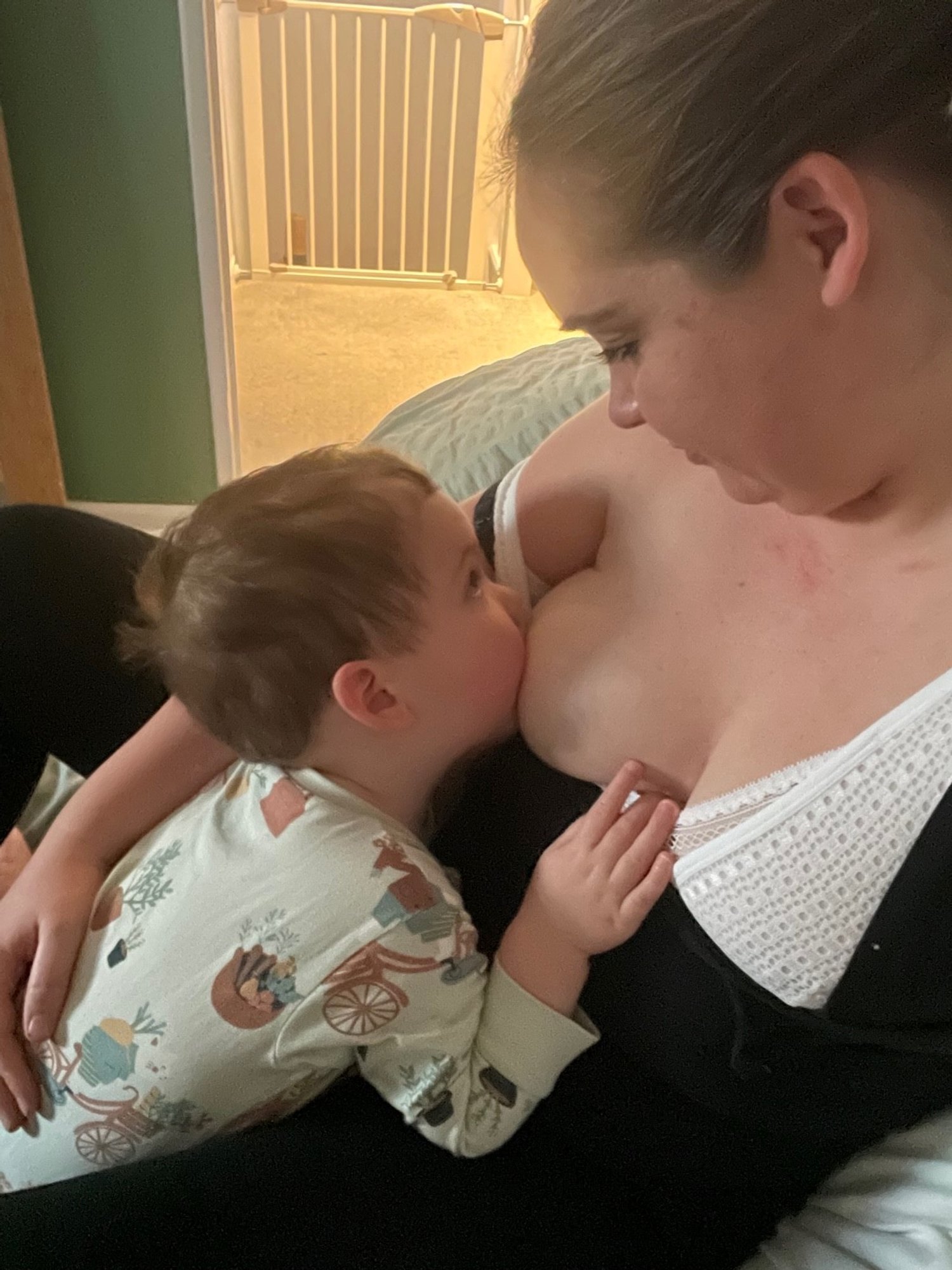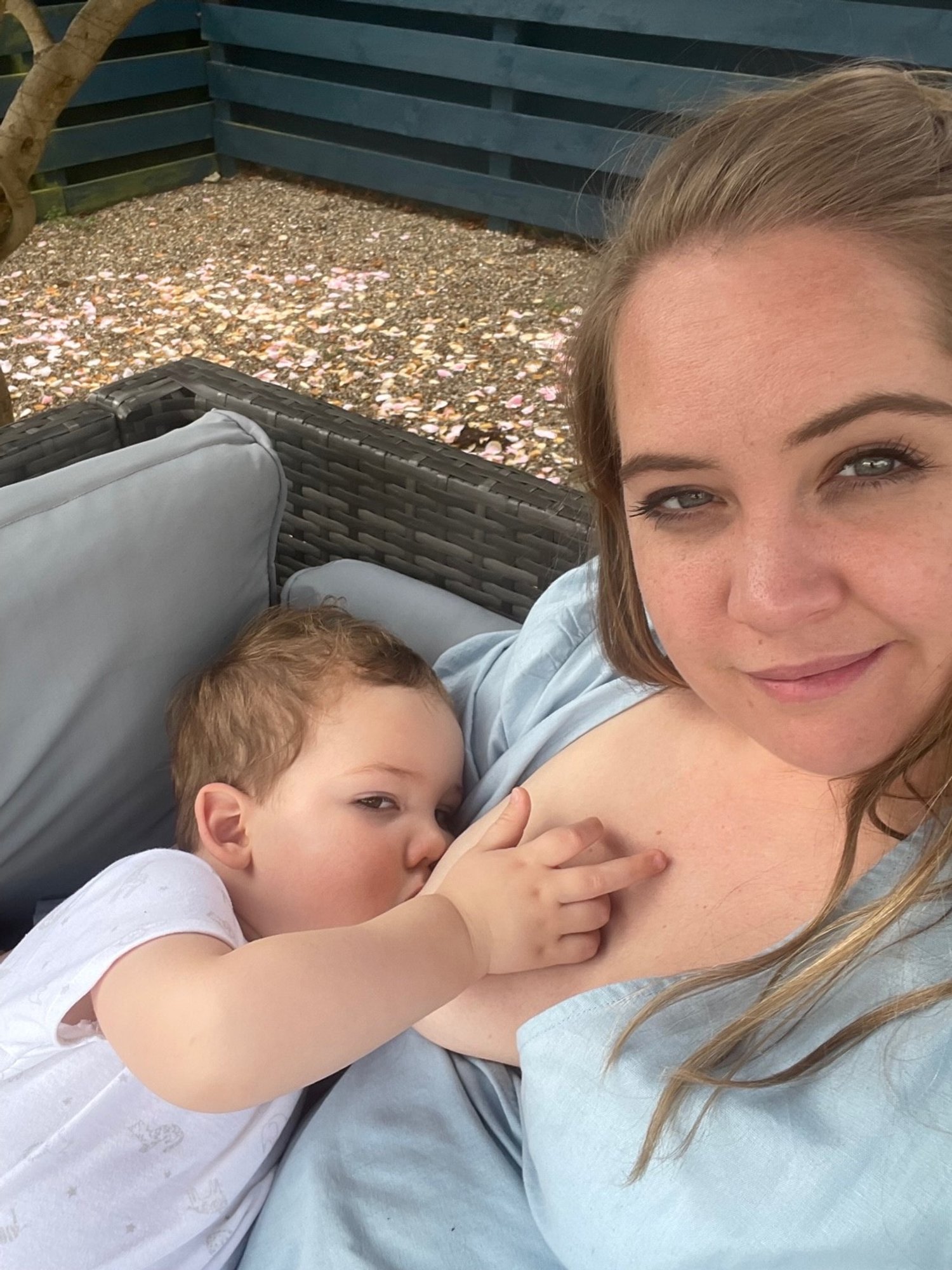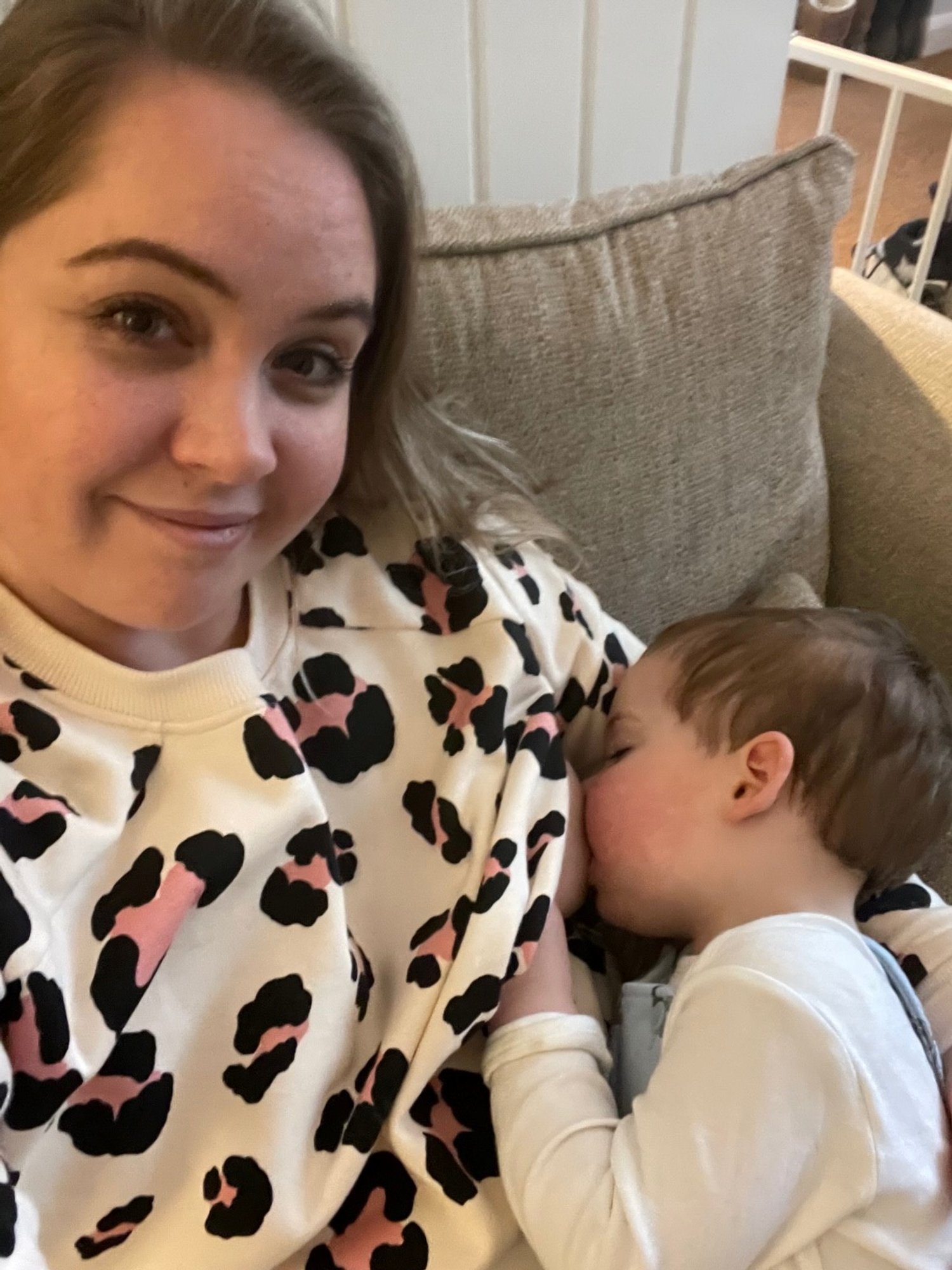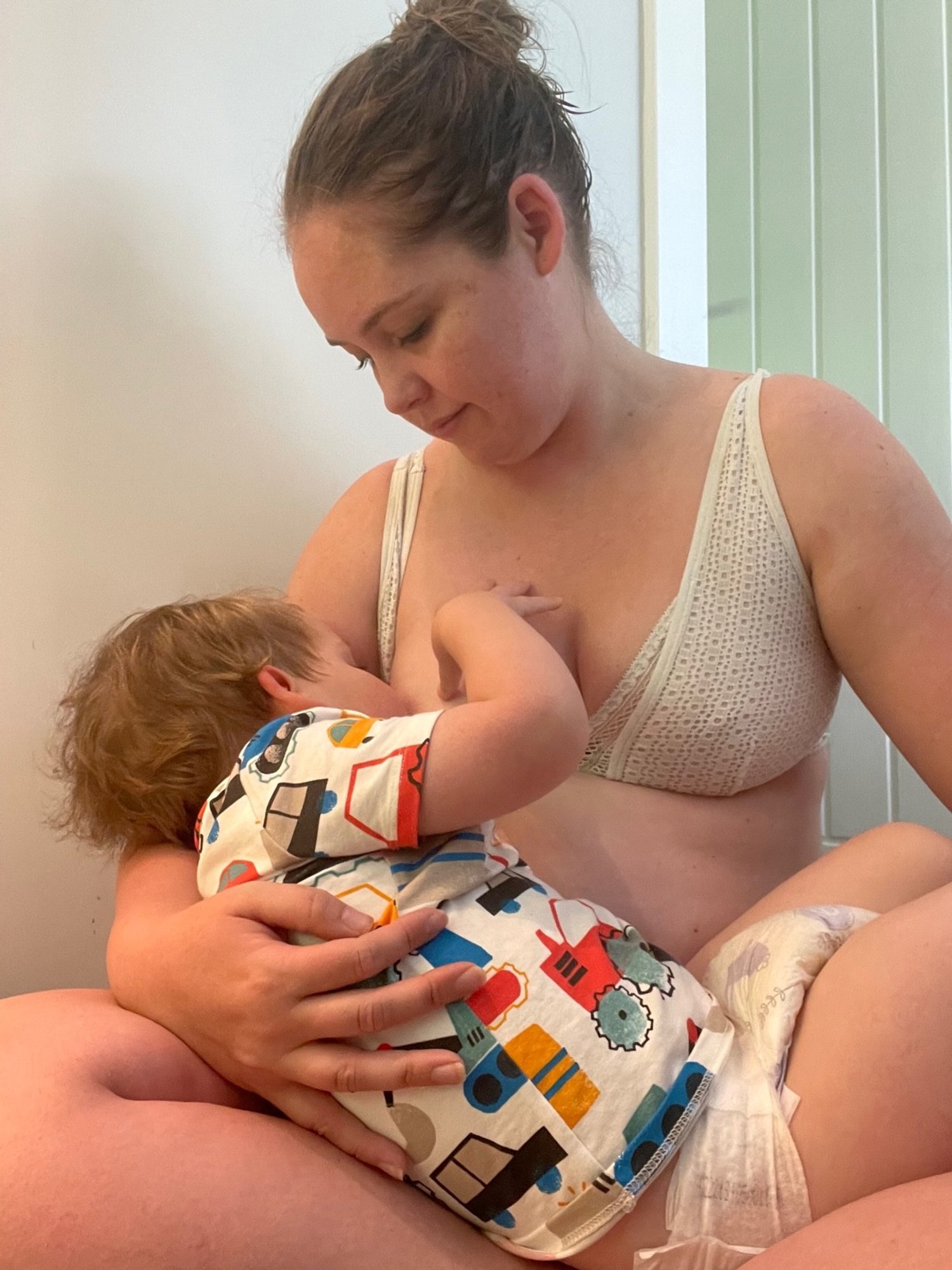My Breastfeeding Journey: Year Two and Beyond
Never once did I think I’d be breastfeeding past a year, especially in the early days, and once we overcame the initial hurdles, my main focus had been to just make it through as much of the first year as possible. Our journey continued throughout the second year, and a little bit after too, and I feel so blessed we had the experience we’ve had and made it this far.
Breastfeeding a toddler always seemed very hippy and out there. In all honesty I’d always felt like I had very little in common with the ‘earth mother’ types that you see breastfeeding toddlers and knew that wasn’t a goal I’d be striving for. I always wondered why women kept breastfeeding that long, and why they hadn’t tried harder to wean their babies off sooner. I wondered what the drive was to keep going, was it more for them than the baby by that point? Was it all just to show off?
I was very humbled by my experience of unplanned extended breastfeeding, and now I hope this blog might help others understand just some of the reasons and feelings behind breastfeeding past a year.
Let’s start with three facts you may or may not already know:
The WHO and UNICEF recommend continued breastfeeding up to 2 years of age or beyond
Between the ages of 12-24 months breastfeeding can still provide one third of energy needs of a child[i]
Immunity benefits improve the longer a baby breastfeeds[ii]
But the benefits aren’t just for the child, by breastfeeding at all, statistically my risk of breast cancer[iii], ovarian cancer[iv] and endometrial cancer[v] is reduced. Some by a compound effect, so the longer I breastfeed the lower the risk! It’s also been linked to lowering the risk of type 2 diabetes, high blood pressure[vi], and osteoporosis[vii]. But whilst these all seem like no brainer benefits you’d want to be trying to achieve I can’t say honestly that they crossed my mind or impacted my decision to continue breastfeeding as long as we did.
Instead our journey just continued organically. It worked for us and our lifestyle and routine, I didn’t have any requirement or instinct to actively stop it. In fact there have been a number of occasions when I’ve been very grateful we were still breastfeeding – as I’m sure it possibly saved hospitalization once or twice.
When Oscar started nursery he came down with every bug and illness known to man, one early delight was Norovirus. Whilst as adults we suffered the effects for 24 hours and then needed a few more days to recover, Oscar threw up for 10 days straight. I cannot express how hard this two week period was for us. Whether you are a first time mum or not, you can manage a day or two of a vomiting bug, by day three and four you get a little desperate and you call your GP for reassurance while the washing machine is on constant. By day five you know things aren’t quite normal and when even water doesn’t seem to be staying down you take a trip to A&E (off the guidance of 111). With still no other diagnosis and everyone just saying it was still within normal bounds, you just keep going. Trying a bit of food here and there, and each time having your hope that it might stay down this time dashed as it projectiles across the living room carpet. Thank goodness for breastfeeding. It 100% was the only way I was able to keep Oscar hydrated through such an extended period of sickness. It was the only thing that stayed down (mostly), and it also worked as a comfort aide as he would stay calm and sleep on me for hours whilst his body fought off the virus. I was seriously drained (physically and emotionally) but felt so lucky that I was keeping Oscar hydrated enough to avoid a stay in hospital hooked up to a drip.
Breastfeeding past a year was not consistent though, we knew what we were doing, there wasn’t any pain, I’d set boundaries with day time feeds, but our feeding routine kept changing with what felt right for us at the time. I guess this was all part of a very long weaning process that I just had to embrace. I believe very much that ‘if it works for you then there is no need to change things’, and as soon as it wasn’t working for us I’d know we needed a change. We introduced formula again and then cow’s milk for the pre bedtime feed (because I no longer had a pumping stash to use), it meant there could be flexibility on who did bedtime, and felt like the right thing to do. To throw in more change Oscar went through a phase of not having milk from anything other than the teat bottle, and then a phase of not even taking it from that. So I was grateful I was still breastfeeding and he was still getting the milk he needed and wanted, we just had to be flexible.
Eventually he didn’t need milk after his nap in the day so we stopped feeding during the day altogether (unless he was ill). We eventually settled more consistently with only breastfeeding first thing in the morning, and just before bed (but not feeding to sleep). This also worked perfectly for returning to work, I had no need to pump during the day, and everyone was happy.
I wasn’t in a rush to stop breastfeeding completely though, but I finally had a night away from Oscar (for a funeral) which gave us a chance to see how we both coped without it. While he had no issues what so ever, I got full and sore by the time I got home the next day so I knew that there was never going to be any cold turkey weaning for us! The next time I went away, it was for a couple of nights for a hotel break. I packed my pump but Oscar and I actually survived just fine, and it was a sign that my milk supply was decreasing a little more, but still plenty in line with what Oscar needed and when.
Despite the changes, I found that second year of breastfeeding the easiest and I was the most confident. Which was just as well because regardless of my reasons, and the fact that WHO and UNICEF say to “continue frequent, on-demand breastfeeding until 2 years of age or beyond”, there were definitely more comments now about what I should and shouldn’t do. “He shouldn’t need breastmilk anymore.” “You shouldn’t still be breastfeeding him so often.” “You should try and get him to use the bottle for feeds.” “He’s too old to be breastfeeding.” And the majority of these comments came from people close to me.
Maybe it was just my gut telling me it’s time, or the impact of hearing these comments frequently, but from about 18months I was starting to wish there was an end in sight. I set a New Year’s resolution that in 2022 I would stop breastfeeding, and at 20 months I had intended to use the month to work through a more proactive weaning process. My main driving factor was that I wanted my body back. My boobs were definitely not what they used to be, and as they weren’t even ‘full’ of milk they were definitely not my favourite feature. I am still learning to love how they are now. I am not ashamed of them, in fact I am nothing but proud of what they have achieved, but I have some way to go to accept the physical changes that have happened along the way.
I found some new accounts on Instagram to change up my newsfeed to support myself through this part of our journey. I recommend following Emily (@sebtheseries) who fiercely advocates for breastfeeding and has gentle guides for mothers, and has a gorgeous picture book to help toddlers wean from breastfeeding too.
But despite my well-meaning plan, month 20 wasn’t the one. It just didn’t feel right and there was something in me that was resisting being so proactive with the process. I simply changed my tactic to ‘don’t offer, don’t refuse’ and trusted Oscar to guide me. When he turned 2 I bought him a new straw bottle with tractors all over – we only ever used it for milk, once in the morning and once in the evening. I offered him ‘tractor milk’ as part of the usual routines and some days he would accept it excitedly, and other times he’s asked for ‘mummy milk’.
The final transition was only about 6 weeks long, when he asked for ‘mummy milk’ he’d feed for shorter and shorter times until it was literally feeding for 20 seconds on each side after which he’d exclaim ‘mummy milk all gone’ and then grab the tractor bottle. I had a week away with work at the end of June which meant there would be somewhat of a ‘cold turkey’ experiment, but we both passed with flying colours and neither of us physically missed breastfeeding at all. There were a couple of super short feeds the week I was back, but it wasn’t long before Oscar just stopped asked for ‘mummy milk’. It was bittersweet. It was what I wanted, it happened organically and easily. But it was a real milestone that Oscar is growing up, and he has one less dependency on me.
So I learned that extended breastfeeding isn’t only for the bo-ho free spirit mothers, it can happen for anyone – even those who least expect it. It is not a shameful or embarrassing thing, it is an incredibly wonderful and empowering experience. If it works for both the child and the mother then no one else’s opinions matter. It will remain no one else’s business and the only comments that need to be shared with a breastfeeding mother (of any age) are those of support and admiration.
I feel the need to add that of course I’m aware that breastfeeding doesn’t happen for everyone, for an incredibly wide number of reasons. Breastfeeding is not a sign of how much you love your child, nor a sign of how good a mother you are, there is no right or wrong when it comes to feeding your child so long as it works for you both. Feeding preferences are personal, so please have confidence in wherever your journey takes you.
And so here I am, closing my breastfeeding journey of just over 2 years. I couldn’t be more proud of myself, and Oscar - we turned a turbulent start into a thriving experience, and continued longer than I ever dreamed possible.
[i] https://www.who.int/news-room/fact-sheets/detail/infant-and-young-child-feeding
[ii] https://www.parents.com/baby/breastfeeding/tips/benefits-of-extended-breastfeeding/
[iii] https://www.nhs.uk/conditions/breast-cancer/prevention/#:~:text=Breastfeeding,and%20oestrogen%20levels%20remain%20stable
[iv] https://jamanetwork.com/journals/jamaoncology/fullarticle/2763398#:~:text=Breastfeeding%20was%20associated%20with%20a%2024%25%20lower%20risk%20of%20invasive,grade%20serous%20and%20endometrioid%20cancers.
[v] https://www.ncbi.nlm.nih.gov/pmc/articles/PMC5473170/#:~:text=Ever%20breastfeeding%20was%20associated%20with,effect%20beyond%206%E2%80%939%20months.
[vi] https://www.cdc.gov/nccdphp/dnpao/features/breastfeeding-benefits/index.html#:~:text=Breastfeeding%20can%20reduce%20the%20mother's,common%20among%20women%20who%20breastfeed.
[vii] https://link.springer.com/article/10.1007/s00198-011-1790-z







